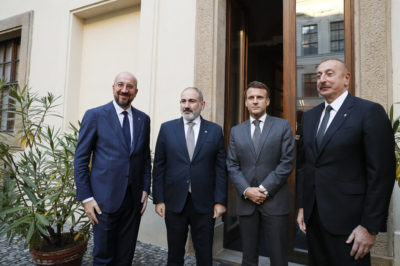YEREVAN — The ADL’s Hagop Vartivarian, during a recent visit to Armenia, interviewed Prime Minister Tigran Sargisian. During the interview, Sargisian showed his objective and perspicacious assessments of the issues facing Armenia and the diaspora. His answers and analyses reveal the command of the subjects he tackles so articulately. The interview appears below.
Hagop Vartivarian: The masses of diasporan Armenians were generally familiar with your name in connection with the financial-economic spheres. Presently, though, you’ve taken up the very important and responsible post of prime minister. Can you tell us how you entered the national-political field?
Tigran Sargisian: Generally speaking, it is difficult to answer where our roots come from. The place where my roots come from, particularly my family environment, has given me valuable traditions in the national/political sense. Of course, I grasped all that more keenly during the seven years that I was studying in Leningrad (now St. Petersburg). First, being away from home, I had the chance to look at it from a distance. I missed my homeland and my family but then I delved deep into the thought of what we represent as a nation and how others see us. Many circumstances during the seven years I spent in Leningrad forced me to pay due attention to our national issues. I can say without hesitation that I began to take a more conscious approach to the fundamental and practical issues facing the homeland. As of 1987, when I returned home from Leningrad, I got involved in the [Karabagh] Movement and gained my life experience.
From Finance to Politics
HV: The world of finance had never been rocked as hard as it has during the past 50 years. Of course, this current crisis, which is international and universal, has had its effect [on Armenia]. In a way, our country is fortunate to have an economist at the head of its chamber of deputies. How can you create a balance with this internal political environment, in the course of searching for ways to solve this economic crisis?
TS: You know, I began to engage in active political activity per se in Armenia, starting in 1987; therefore, I literally know all the politicians active in that arena. And, in that sense, since I personally know the political levers and political movements, coupled with the fact that the political parties have been formed in our time, that basically makes it easier to understand the motivation of those political parties, their motives, their ideology and aspirations. That knowledge also makes it possible to engage in dialogue with them.
On the other hand, of course I was more occupied with economic issues during the past 10 years, being the president of the Central Bank. That also afforded the opportunity to remain free from political demagogues and concentrate on, study the financial and economic situation. Trying to be on such levels is very time consuming.









